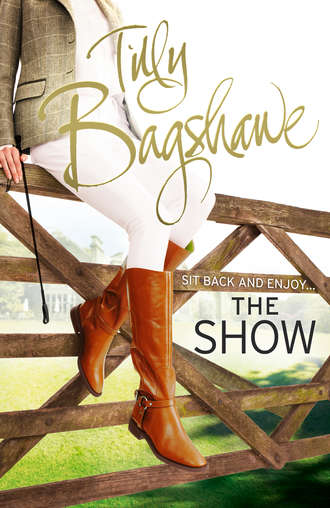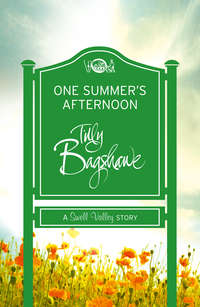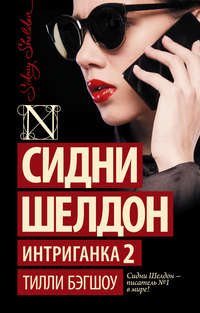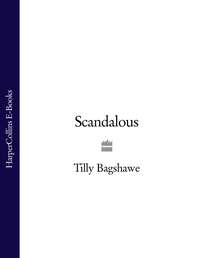
Полная версия
The Show: Racy, pacy and very funny!
What do I have to lose?
CHAPTER FIVE
The Reverend Bill Clempson, Fittlescombe’s new vicar, looked out through the double-glazed windows of his ugly modern bungalow at the gardens of what used to be the vicarage. The stately Victorian red-brick house, covered in wisteria and surrounded by glorious formal grounds, was now owned by an investment banker named Chipchase. The Church had sold it years ago to raise some cash.
Fair enough, thought Bill. The Old Vicarage was enormous, big enough for two or three families. As a single man, Bill Clempson would have rattled around in it like a pebble in a shoe. Still, there had been no need for the bungalow replacing it to be quite so hideous and soulless; it was unquestionably the ugliest structure in the entire village. Not even the Reverend Clempson’s beloved red Mini Cooper, gleaming proudly outside like a newly polished snooker ball, could lend his grotty little home much cheer.
The bungalow did, however, afford marvellous views, not only of the vicarage gardens but of St Hilda’s Church and Fittlescombe village green beyond. It was mid-May now, and the entire Swell Valley was a riot of blossoming fruit trees. The pretty front gardens of the cottages along the High Street overflowed with colour and scent, the hollyhocks and rose bushes and foxgloves and jasmine all heralding the close of spring and the imminent approach of summer.
It’s such a stunning place, thought Bill. So unspoiled. Then he thought about this evening’s parish meeting and his resolved hardened. It was his job to ensure that Fittlescombe remained unspoiled, and preserved for everyone to enjoy. This awful reality television show that Gabe and Laura Baxter were proposing to start filming must not be allowed to get off the ground.
Of course, there were those in the parish who questioned his motives. The verger, Nigel Dacre, had as good as accused him of opposing the television show solely because Gabe was behind it. Everybody knew that Gabriel Baxter and the Reverend Clempson didn’t exactly see eye to eye. ‘Rambler-Gate’ was generally considered to be fifteen-love to Gabe. This was Bill’s chance to even the score.
‘It’s not about point-scoring, Nigel,’ the vicar insisted. ‘It’s about what’s best for our community.’
‘But you don’t know anything about it,’ the verger protested. ‘None of us does yet.’
‘I know enough,’ said Bill.
The show was to be called Valley Farm, and had been commissioned by Channel 5 (never a good omen). It centred around Wraggsbottom Farm, but would also take an interest in ‘village life’, whatever that meant. Intrusion, most likely. As far as the vicar was concerned, that was more than enough. It must be stopped, at all costs.
Bill’s predecessor, the Reverend Slaughter, had studiously avoided village politics. Beyond Sunday services, Fittlescombe’s former vicar had limited his pastoral work to visiting the sick, giving the occasional speech at primary school assemblies, and judging the cake competition at the annual village fete.
Perhaps, Bill thought, it was part of the Lord’s plan that he, Bill Clempson, should have taken over the reins at Fittlescombe just as the threat of this television show became real? Half the village – the same half that thought Gabe an ogre for refusing to let his neighbours walk on his land – were up in arms about the idea of having a television crew permanently based there, poking their cameras and microphones in where they weren’t wanted and turning the village into a glorified theme park. Bill would be their voice, their leader. He would shepherd his flock through the danger posed by Gabe Baxter’s rampant selfishness. A Channel 5 film crew in the village didn’t quite constitute the valley of death, perhaps, but one fought one’s battles where one found them.
Walking away from the window, Bill looked at his watch. Five o’clock. The meeting would start at seven, in the village hall. Although it had not exactly been kept secret, neither the Baxters nor Eddie Wellesley had been informed or invited. The village needed a battle plan, and you could hardly hope to formulate that with your enemy in the seat next to you, dunking Hobnobs into his tea.
The hall was already packed when Santiago de la Cruz walked in. Despite having lived in the valley for years, the Sussex cricketing hero still turned female heads. His arrival tonight was especially exciting as he’d brought an extremely attractive blond friend with him. In jeans and open-necked shirts, and smelling of cologne, the two of them looked more like rock stars than locals as they made their way towards the front of the room, where Santiago’s wife, Penny, was saving them seats. Only when the blond removed his sunglasses did people realize that it was James Craven, England’s most talented and charismatic all-rounder since Botham.
‘You’re late,’ Penny whispered crossly as they sat down. ‘It’s about to start.’
‘That’s not late,’ Santiago whispered back, kissing her on the cheek. ‘That’s on time. You remember James?’
‘Of course.’ Penny smiled. ‘I can’t believe Santiago dragged you to a village meeting.’
‘Nor can I,’ James groaned, rubbing his eyes. ‘I’m so hungover, my breath must be fifty per cent proof. If anybody lights a match in here, the whole place will go up like Waco.’
‘But it’s seven o’clock at night,’ said Penny. ‘You’ve had the whole day to recover.’
‘You wouldn’t say that if you’d seen what I put away last night. That’s what heartbreak can do to you.’
Santiago rolled his eyes. ‘Oh, please. Heartbreak? You barely knew her.’
‘Of course I knew her.’ James looked hurt.
‘Oh yeah? What was her middle name?’
‘Esmerelda.’ James grinned.
‘Exactly. So stop moaning,’ said Santiago. ‘Besides, you’re buying a cottage here. That makes you a resident.’
‘I looked at a cottage,’ protested James. ‘Because you made me. I didn’t buy it.’
‘Whatever,’ Santiago waved a hand dismissively. ‘You will buy it. And someone needs to stand up to this lynch mob. Look at them all, just sitting there waiting to rip the Baxters to shreds.’
‘I hardly think that’s fair …’ Penny protested. ‘They’re concerned for the village.’
‘They’re ignorant busybodies, bitter because Gabe turfed them out of his garden. And why bloody shouldn’t he?’ said Santiago robustly. ‘I think a TV show will be great for the village. Why not? It could mean investment and jobs. Most of them are just envious they didn’t have the idea first.’
‘Good evening everyone. Thank you all for coming.’
Reverend Clempson banged a gavel self-importantly on the little wooden table at the front of the room. With his thinning hair, reedy voice and twitchy, nervous manner, he reminded Santiago of a meerkat. And not in a cute way.
‘As you know, filming is due to start on the pilot episode of Valley Farm in a matter of weeks. Tonight’s meeting is an open forum to discuss our response. Hopefully, as a community, we can come up with some practical and positive suggestions.’
‘I have a suggestion.’ Santiago raised his hand. His deep, booming Latin voice rang out in gloriously sexy contrast to the reverend’s wheedling whine. ‘Why don’t we give this thing a chance, support our neighbours and stop acting like a bunch of playground bullies?’
The room erupted. Bill Clempson banged his gavel repeatedly to no effect as furious villagers tore into Santiago and into one another in a thoroughly unedifying shouting match. Who did Santiago think he was, sticking up for his rich mates and accusing ordinary villagers of bullying?
‘Wraggsbottom Farm must be worth four million as it is,’ Kevin Jenner, the butcher, pointed out furiously. The Jenners were a well-known Fittlescombe family. Kevin’s cousin Danny was the landlord at The Fox. ‘And we all know Sir Eddie’s rolling in dirty money. Why should those fat cats be allowed to make even more money by exploiting the village and ruining it for the rest of us?’
‘Oh, so it’s about money, is it? I see,’ said Santiago. ‘And here’s the reverend telling everybody it’s about protecting the natural beauty of Fittlescombe! Last time I read the Bible, envy was a deadly sin.’
‘So’s greed!’ someone yelled back.
Penny flushed scarlet with embarrassment, watching her husband take on all-comers. Why couldn’t Santi let Gabe Baxter fight his own battles?
James Craven pulled a bottle of ibuprofen tablets out of his inside jacket pocket and swallowed two grimly. ‘Do you think it’s going to get physical?’ he whispered to Penny. ‘If it does, I warn you, I’m off. I’m a terrible coward. They don’t call me Craven for nothing. I leave all that macho bollocks to your husband.’
In the end, as so often with village tensions, it was Max Bingley, the headmaster, who calmed things down.
‘Look, this is ridiculous. Angela and I aren’t happy about this programme being made here either. And our objections have nothing to do with wealth or how much people’s homes are worth.’
‘I bet they’re not,’ muttered Kevin Jenner.
Angela Cranley, Max’s long-term partner, owned Furlings, the local manor, by far and away the most spectacular house in the valley, if not the entire county.
‘For us, it’s about privacy. However, I don’t believe it’s right or fair to hold meetings like this one without allowing the Baxters and Sir Edward to put their side of the case.’
The vicar opened his mouth to speak, but Max ignored him.
‘It may be possible to reach some sort of compromise. But only if we all behave in an open and reasonable way, and engage the other side in dialogue. The reality is, legally there’s little or nothing we can do. The programme is being shot on Gabriel Baxter’s land, and on public streets. Beyond keeping the cameras out of our own homes and property …’
‘May I say something?’
A loud, authoritative voice rang out from the back of the hall. Everybody turned to see who had spoken.
David Carlyle, editor of the Echo and Fast Eddie Wellesley’s most outspoken enemy, stood with his back against the door. In an expensive but naff grey suit that was cut too tightly, solid gold cufflinks and a garish red silk tie, Carlyle looked every inch the rich and powerful man that he was. When he smiled, as he did now, his teeth flashed brilliant white, giving him a look that was part toothpaste commercial, part wolf.
‘With respect to the last speaker, there’s a lot we can do. As a concerned local resident, I don’t want this valley being defaced any more than you do.’
‘Shame you built that godawful eyesore of a “McMansion”, then,’ James whispered to Penny under his breath. ‘Architectural services care of Barbie and Ken.’
Penny giggled. ‘Don’t be mean. His wife’s really lovely.’
Carlyle was still talking.
‘With the help of my newspaper, and a carefully orchestrated campaign to raise awareness of what’s really going on here, a scandalous abuse of wealth and privilege, I believe we can put an end to this, quickly and finally. Now, it will take money. But I’m happy to foot the bill for any action you can all agree on. And I’ll make sure you get coverage, not just locally but nationally.’
For the second time that evening, order disintegrated. Reverend Clempson’s attempts to assert any authority over proceedings evaporated utterly in the face of David Carlyle’s confidence, charisma and cheque book, as villagers thronged eagerly around their new champion.
‘What do you think of him?’ Penny de la Cruz asked Angela Cranley as both women prepared to leave. Clearly nothing concrete was going to be decided at tonight’s meeting.
‘David Carlyle? I don’t know him,’ said Angela. ‘But I think he means business. He reminds me a bit of Brett. I wouldn’t want him for an enemy, that’s for sure.’
‘He hates Eddie Wellesley,’ said Santiago. ‘How can these people be so stupid?’ He looked at his neighbours, thronging around Carlyle like devoted fans around a famous footballer. ‘Can’t they see he’s using them to further a personal vendetta?’
‘The whole thing is stupid,’ Max Bingley muttered under his breath. ‘And it’s getting quite out of hand.’
David Carlyle was also trying to leave, shaking the vicar warmly by the hand and talking to him intently as he made his excuses to the assembled villagers.
‘Look at bloody Clempson,’ Max Bingley spluttered. ‘He’s blushing like a teenage girl who’s just been asked on her first date. Whatever happened to impartial moral leadership?’
Angela Cranley rolled her eyes. She loved Max, but he could sound so terribly headmasterly at times.
Santiago was tapping away on his phone as they all filed out.
‘What are you doing?’ Penny asked him.
‘Texting Gabe. Someone has to warn him.’
‘Warn him of what?’
‘The lynch mob.’
‘That’s a bit melodramatic,’ said Penny. ‘He already knows people are angry about the show, and the vicar’s trying to curry favour with the congregation. He only has to walk into Preedys’ or down the High Street to realize that.’
‘Yes, but this is different,’ said Santiago. ‘This isn’t just a few disgruntled neighbours and a desperate-to-please vicar with a Che Guevara complex. This is one of the most powerful editors in Fleet Street. David Carlyle’s out to finish Eddie Wellesley. Gabe and Laura are going to get caught in the crossfire.’
David Carlyle leaned back in the taupe leather seat of his new Aston Martin Rapide and pushed his foot down harder on the accelerator. He felt good. Powerful. In control. Tonight’s meeting had gone well. His new car roared impressively, surging forward at the tap of his foot like a tethered lion straining at the leash as he weaved his way through the Downs towards Hinton. He would go home, report his triumph to Louise, his loyal wife of over twenty years, pour himself a glass of Oban single malt, and set about the serious but enjoyable business of pissing on Eddie Wellesley’s latest pet project.
The feud between David Carlyle and Eddie Wellesley had begun years earlier, back when David had worked as the senior spin doctor for Tristram Hambly, the prime minister. Eddie had been part of a group of senior Tories who’d pressured Hambly to get rid of David. The reason for their dislike was simple. They saw David Carlyle as a bully: unscrupulous, unethical, vile to his junior staff and all the interns and tea-makers at Number Ten. Yes, he was good at his job – brilliant, even. A political animal to his bones, David Carlyle understood the importance of controlling information: when to leak, when not to leak, who to stick close to and who to betray. His only political ideal was winning elections, and he would go to the ends of the earth to achieve this end, no matter who he worked for. But, as Eddie Wellesley put it to the PM, an old friend, ‘Life’s too short to be spent in the company of arseholes, Tristram.’
And so David Carlyle was ‘reshuffled’ and a marvellous woman from Saatchi’s, Margot Greene, brought in to replace him.
Eddie Wellesley had won his little battle. But he had made himself a very dangerous enemy.
After David left Number Ten, his career had gone from strength to strength. He had landed the head of News job at the Echo, rising quickly to become editor when Graham Davies retired. Since taking over, David had tripled the paper’s readership and made it a serious Fleet Street player once again. The success was sweet, but nothing could quite replace the thrill of politics, the Machiavellian Sturm und Drang of life at Number Ten, pulling the strings behind the scenes. Even so, David knew he would never go back. That time had passed, and new challenges awaited. But he never forgot or forgave the plot to oust him. David saw what had happened to him as a straightforward case of snobbery. ‘Fast Eddie’ Wellesley, Tristram Hambly and two-thirds of his enemies in Cabinet had all been at either Eton or Oxford together. David’s father had been a printer and his mother worked in a butcher’s shop. He’d heard the sniggers and snide remarks at Number Ten, about his grey shoes and his ‘naff’ ties and his use of taboo words like ‘pardon’ and ‘toilet’. The bastards had been out to get him from the start.
‘Don’t let it bother you,’ his wife Louise used to tell him. ‘Who cares what they think?’ Louise was from a similar background, the middle daughter of a carpet fitter from Dagenham. And the wonder of it was, she really didn’t care. But David did. Desperately. He loathed the clubby-ness of the Tory party, and the myriad ways in which he was shut out of the PM’s inner circle. But what infuriated him most of all was the way that ordinary, working-class voters – people like him – seemed to warm to Eddie Wellesley. They found Eddie witty and straightforward and charismatic, and forgave all his foibles as endearing eccentricities. Little did they know how much Eddie and his clique of posho-cronies despised them and all they stood for. It was up to David to set them straight.
He spent years, and hundreds of thousands of pounds of his paper’s money, investigating Fast Eddie’s tax affairs. When he finally nailed Eddie he did it in style, publishing a brutal exposé of his dodgy offshore schemes and bribing all his whores to testify against him. Eddie’s resignation was a good day for David Carlyle, the day of his arrest an even better one. But the day that they carted the bastard off to jail? That had been the happiest day of David’s life.
But now Eddie Wellesley was back, and trying to reinvent himself as a television producer. David felt his chest tighten. The barefaced gall of the man! He planned to do a reality show, no less: stooping to conquer, a real man of the people. David felt sick. Media was his world, his business. Just as politics had been his business, until Eddie came along and poisoned people against him with his lethal blend of snobbery and charm. Eddie Wellesley was pure spite, wrapped up in a shining silver bow. And now, to top it all, the bastard had even followed David here, to the Swell Valley. Why couldn’t Wellesley have bought a house in the fucking Cotswolds like the rest of his posho Tory pals? No one wanted him in the Swell Valley with his TV cameras and his new posse of village cronies, lead by that popinjay Gabe Baxter.
David wondered exactly which Old Etonian strings Fast Eddie had pulled this time, to get Valley Farm off the ground. Apparently he’d already convinced some American bimbo to leave one of the big US networks and front the thing alongside Gabe, no doubt with an eye on the international market. Arrogant bastard.
The triumph and satisfaction David had felt, getting Eddie sent to prison, hadn’t lasted long. Inexplicably, the great British public still adored him. If Eddie made a success of things in the TV world, no one would remember his fall from political grace. He’d be a survivor. Teflon Eddie, the comeback kid.
But he wouldn’t make a success of it.
Not this time.
David Carlyle was going to see to that.
He wouldn’t rest until that son of a bitch Wellesley was a broken man.
Pulling in through the electric gates of his Southern ranch-style home, David left his car in the driveway. He heard the satisfying ‘beep beep’ of the Aston’s automatic lock, followed by the gentle splashing of water from the dolphin fountain he’d had put in as a centrepiece in front of the house. Louise loved dolphins, and David loved Louise. She’d been with him since the beginning, since they were both kids, back when he had nothing. Louise had believed in him even then, when all he could offer her was a cramped room over a Falafel King in Tufnell Park. She’d sacrificed endlessly for his career, never complaining about his long hours, or the meagre pay in the early days, or the black moods that could grip him when work wasn’t going well. Louise was the great miracle of David’s life, always seeing the funny side, always in his corner. His success was her success, their success, and if Louise wanted a dolphin fountain then she would bloody well have one. David knew that the local upper-class mafia mocked his house, but he didn’t give a rat’s arse. If they preferred to live in draughty old piles full of damp and mould and mouse shit, that was up to them. They could keep their tatty Persian rugs and Jacobean furniture, and he would keep his state-of-the-art sound system, dolphin fountain and marble Jacuzzi whirlpool bath, complete with rainbow light feature panel, thank you very much.
Louise greeted him in the doorway, looking strained.
‘You said you wanted tea at eight.’
In a pale pink dress and matching heels, and with her hair newly blow-dried, she’d clearly made an effort to look nice. Louise Carlyle was a big believer in working at one’s marriage. ‘Keeping the magic alive’ wasn’t easy, especially when you were married to an obsessive workaholic like David. But no one could say Louise didn’t try.
‘That’s right.’
‘It’s nine thirty, David. The lasagne’s ruined. What happened?’
‘It was bloody brilliant.’ David’s eyes lit up. ‘The whole village is up in arms about this TV show.’
‘Are they?’ Louise knew that there was some dissent. But she’d also heard plenty of people excited about Valley Farm and willing to give the idea a chance.
‘Oh yeah,’ said David. ‘Eddie Wellesley’s up to his neck in it this time.’
Louise sighed. Eddie Wellesley. Again.
‘By the time I’m finished with him there won’t be a voter in England who can stand the fucking sight of him.’ David grinned.
Louise Carlyle loved her husband and she was loyal to a fault. But David wasn’t the one who had to live here, day in, day out. While her husband was up in London, churning out newspapers, Louise had worked hard to make friends in the valley, not just in Hinton, but in the livelier villages of Fittlescombe and Brockhurst too. It wasn’t easy when one didn’t have children. But Louise had joined the WI, and in recent weeks had started to become close to its chairwoman, Jenny Grey, and to the lovely Penny de la Cruz, who also helped with the church flowers. Louise knew that Penny’s husband Santiago was friends with Gabriel Baxter, and that the Baxters were involved in this TV show of Eddie Wellesley’s. If David started making waves again (forget ‘if’, he had started), the ripples were bound to affect Louise’s own friendships. She wished, just once, that David would consider things like that. But she knew if she brought it up he’d feel unsupported and let down, and she couldn’t have that. Sometimes it was exhausting, the degree to which David needed to be mothered.
He hugged her tightly. ‘Lasagne, did you say?’
‘Not any more. It’s burned to a crisp. You said you wanted to have dinner, just the two of us.’
‘Don’t worry, love. Doesn’t matter.’ David was already moving past her, towards his study. ‘I’ll just have a Scotch and a packet of crisps. I need to get to work anyway. I want to do some research tonight on this Yank woman Eddie’s bringing over. See what dirt my news desk can dig up.’
Louise Carlyle stood and watched as her husband walked into his study, closing the door behind him. He hadn’t kissed her. Hadn’t asked about her day. Hadn’t apologized for being late or ruining the meal that she’d prepared for them.
He wasn’t always like this, she reminded herself. He’s a good man, really.
Louise had loved David for all her adult life, and a good few years before that, and she knew a side to him that few people got to see. Her David was romantic and passionate. He was funny and loyal and kind, forever doing little things for her, like leaving a sugar mouse on her pillow every time he went away on a trip, because Louise had mentioned on an early date how much she loved them as a child. Yes, he was ambitious and he worked hard. Louise suspected he was tough as a boss and she knew many of his staff disliked him. But it was only because his standards were high. David wanted a better life, for both of them. Becoming the prime minister’s spin doctor had been a dream come true, but it wasn’t some sort of gift. It was a dream he had worked for and felt he deserved. When Eddie Wellesley took that away from him, he took more than just a job. Other people saw David’s anger. But Louise saw his pain. It was awful and it had changed him profoundly. After that there were no more sugar mice, no more thoughtful gestures. It was as if there was no room for anything but David’s raging resentment, his need to exact vengeance. He’d made plenty of enemies in the course of his professional life, but with Eddie Wellesley it was different. Personal. Louise didn’t hate Eddie Wellesley, but she did wish he would go away, far away, and never come back.







